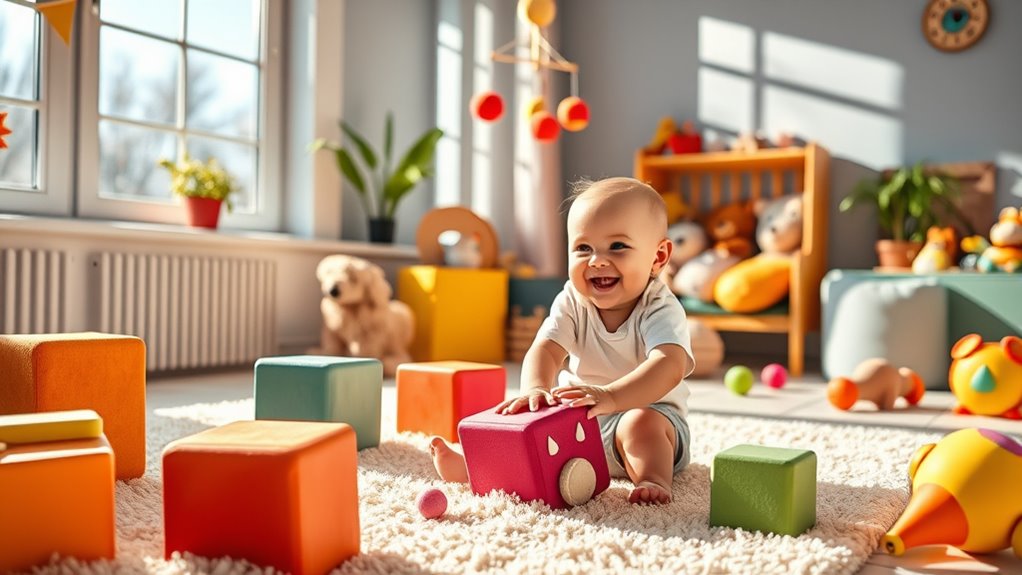For age-appropriate playtime ideas, start with tummy time to strengthen your baby’s neck and back muscles. Engage them with colorful books during storytime to boost language skills. Introduce sensory bags filled with various textures for exploration. Encourage crawling games or push-and-pull toys to enhance gross motor skills. Play peekaboo to teach object permanence, while group activities can foster social interactions. Stick around for more creative ways to support their development!
Key Takeaways
- Engage in tummy time to strengthen your baby’s neck, shoulders, and back muscles, laying a foundation for crawling and walking.
- Use sensory bags filled with various textures to stimulate your baby’s senses and keep them entertained.
- Incorporate mirror play to promote self-discovery while enhancing visual tracking and cognitive skills.
- Organize playdates to foster social skills and emotional intelligence through interaction with peers.
- Utilize push and pull toys to encourage gross motor skills development and improve coordination during playtime.

Playtime is essential for your baby’s growth and development, as it not only entertains but also fosters crucial skills. Engaging in activities like tummy time helps your little one strengthen their neck, shoulders, and back muscles. As you place your baby on their tummy, they’ll naturally start lifting their head and pushing up, which is vital for their motor development. You’ll notice how this simple activity lays the foundation for future milestones like crawling and walking.
Playtime is crucial for your baby’s development, enhancing motor skills through activities like tummy time that prepare them for future milestones.
Incorporating mirror play can be another delightful activity. Babies love looking at their reflections, and using baby-safe mirrors encourages self-discovery and helps develop visual tracking skills. When they see themselves, it sparks curiosity and laughter, making it a fun bonding experience for both of you.
Sensory exploration is key to stimulating your baby’s senses. You can create sensory bags filled with different textures like soft fabrics, rubber toys, and rough objects. This lets your baby distinguish between various sensations while keeping them entertained.
Additionally, introducing mild-tasting foods during tasting games can expand their palate and make mealtime more enjoyable.
Outdoor activities are also fantastic for your baby’s development. Taking them for walks allows them to experience new sights, sounds, and smells. The fresh air and nature can be incredibly stimulating, promoting cognitive and sensory growth. You can engage in nature walks, allowing your baby to feel the grass or touch leaves, which encourages exploration.
Motor skills can be developed through gentle exercises like clapping or cycling motions, enhancing coordination. Crawling games, where you create obstacles for them to navigate, can be both fun and beneficial.
Using push and pull toys encourages gross motor skills, while balance activities with simple ball games can improve their coordination.
Cognitive development flourishes through playful interactions. Playing peekaboo teaches object permanence, while story time with colorful books engages their attention and supports language development. Naming games, where you point to objects and name them, are also effective in building their vocabulary.
Social interactions are vital as well. Arranging playdates with other babies fosters social skills and emotional intelligence. Imitation games can help them learn and bond with others, while parental interaction during play nurtures their emotional development.
Incorporating educational toys like Montessori-Inspired ThinkMax Matching Eggs can further enhance their cognitive skills and make playtime even more enriching.
All these activities combined ensure that your baby’s playtime isn’t just fun but also a vital part of their growth journey.
Frequently Asked Questions
What Are the Best Toys for Newborns to Promote Development?
When you’re choosing toys for newborns to promote development, focus on sensory and motor skills.
Rattles stimulate grip and sound, while mirrors help them engage with faces. High-contrast toys aid vision, and textured items introduce different surfaces.
For motor skills, consider soft squeeze toys and play gyms that encourage reaching.
Also, interactive toys can boost cognitive development by encouraging exploration.
These options foster essential skills during those crucial early months.
How Long Should Playtime Last for Babies at Different Ages?
Imagine your little one giggling as they discover their tiny hands.
At different ages, playtime varies: for newborns, it’s brief—about 35-60 minutes of wake time. From 4 to 6 months, aim for 60-90 minutes as they engage more.
By 7 to 9 months, play can stretch to 2 hours and older infants can enjoy 60 minutes of independent play.
Each stage is crucial for their growth and development, so embrace those joyful moments!
Are There Any Safety Concerns With Baby Playtime Activities?
Yes, there are safety concerns with baby playtime activities. You should always provide head and neck support, avoiding jostling movements.
Keep an eye out for choking hazards and ensure toys are safe. Supervise playtime continuously to prevent falls and injuries.
Make sure the play area is free from sharp objects, dangling cords, and unstable furniture. Engaging with your baby during play helps ensure their safety and promotes a nurturing environment.
How Can I Engage My Baby During Solo Playtime?
Imagine a flower blooming in the sun, reaching for light. You can engage your baby during solo playtime by offering simple toys, like blocks or soft balls, that spark curiosity.
Limit the options to encourage deeper exploration, just as a flower focuses on one sunbeam. Allow unstructured play while you’re nearby, creating a safe environment that fosters independence.
This balance nurtures their growth, giving them the freedom to flourish in their own way.
What Are Signs That My Baby Is Overstimulated During Play?
When your baby’s overstimulated during play, you might notice signs like limpness, glassy eyes, or a flushed face.
They may cover their eyes or cry excessively, indicating they need a break.
If your baby becomes irritable, struggles to communicate, or throws tantrums, it’s a clear sign they’re overwhelmed.
Pay attention to these cues, and adjust the environment to help soothe them.
A calm space can make a big difference!
Conclusion
Incorporating age-appropriate playtime into your baby’s routine not only fosters development but also strengthens your bond. Whether you’re crafting a mini obstacle course or engaging in silly dance-offs, these moments create lasting memories. Remember, playtime is like a treasure trove—each activity unveils new skills and joy. So, grab that rubber ducky and dive into the fun! Your baby’s laughter will be the soundtrack of your adventures together, making every day feel like a scene from a classic sitcom.









